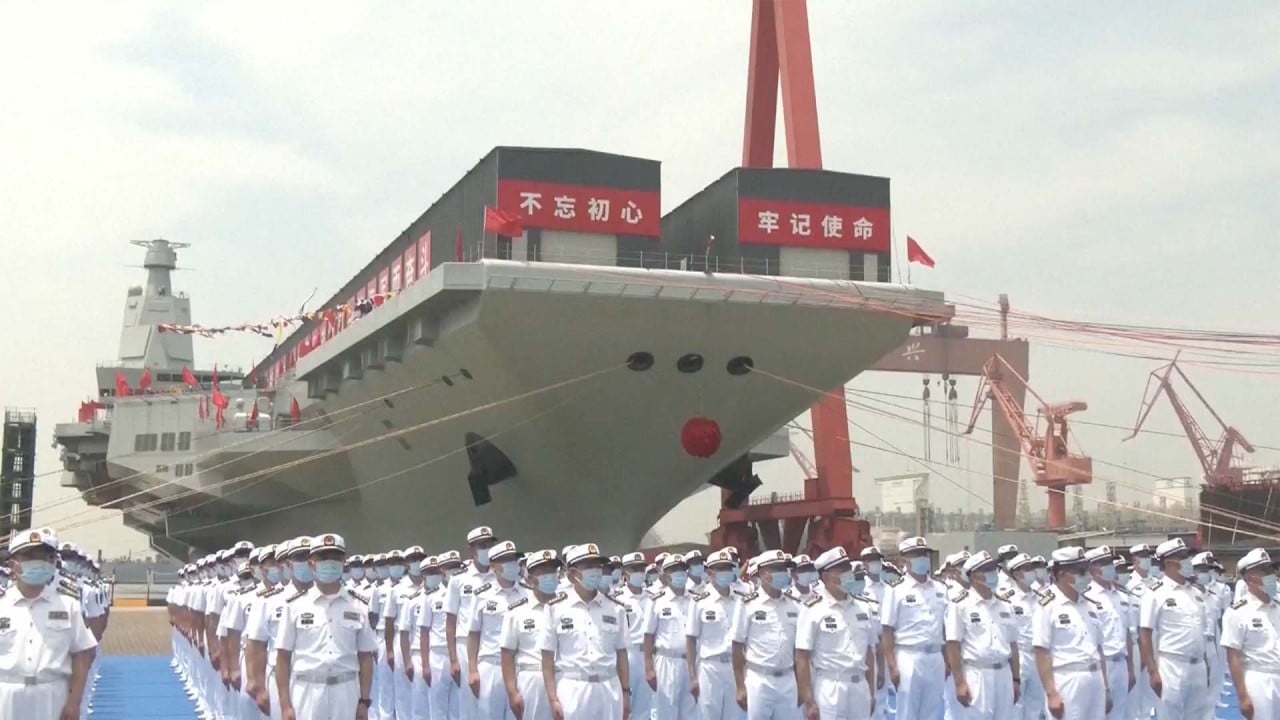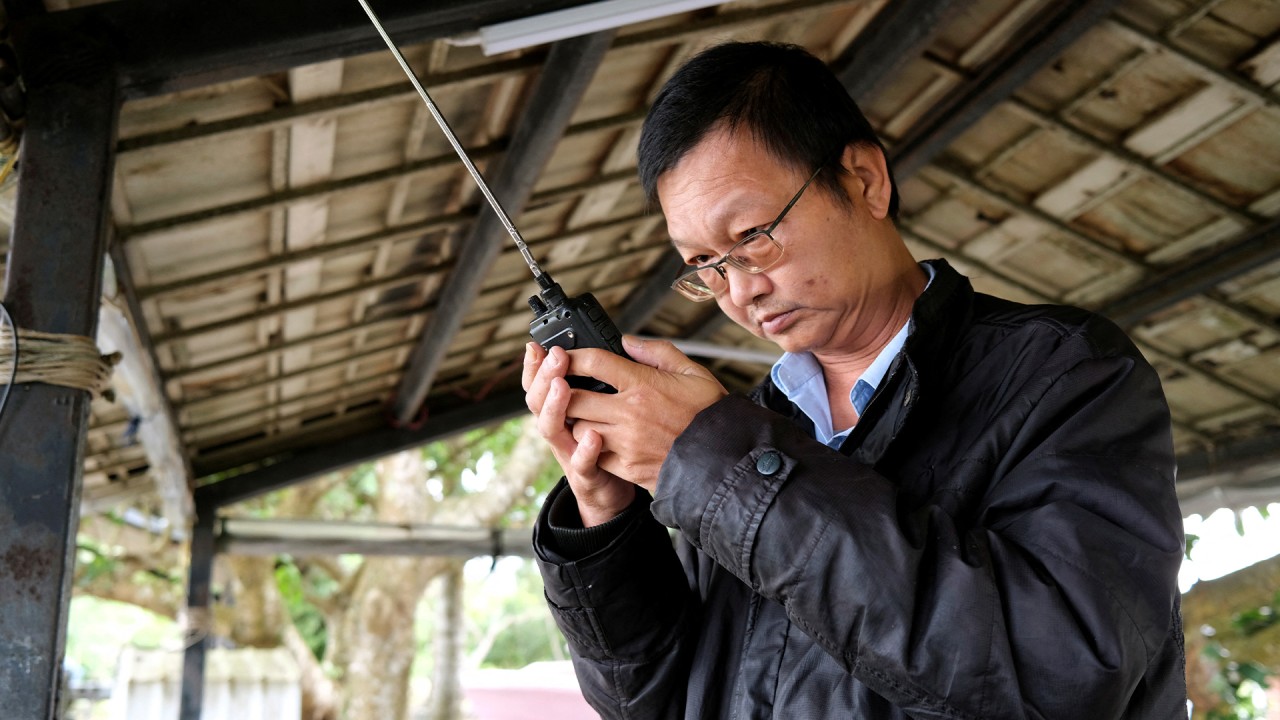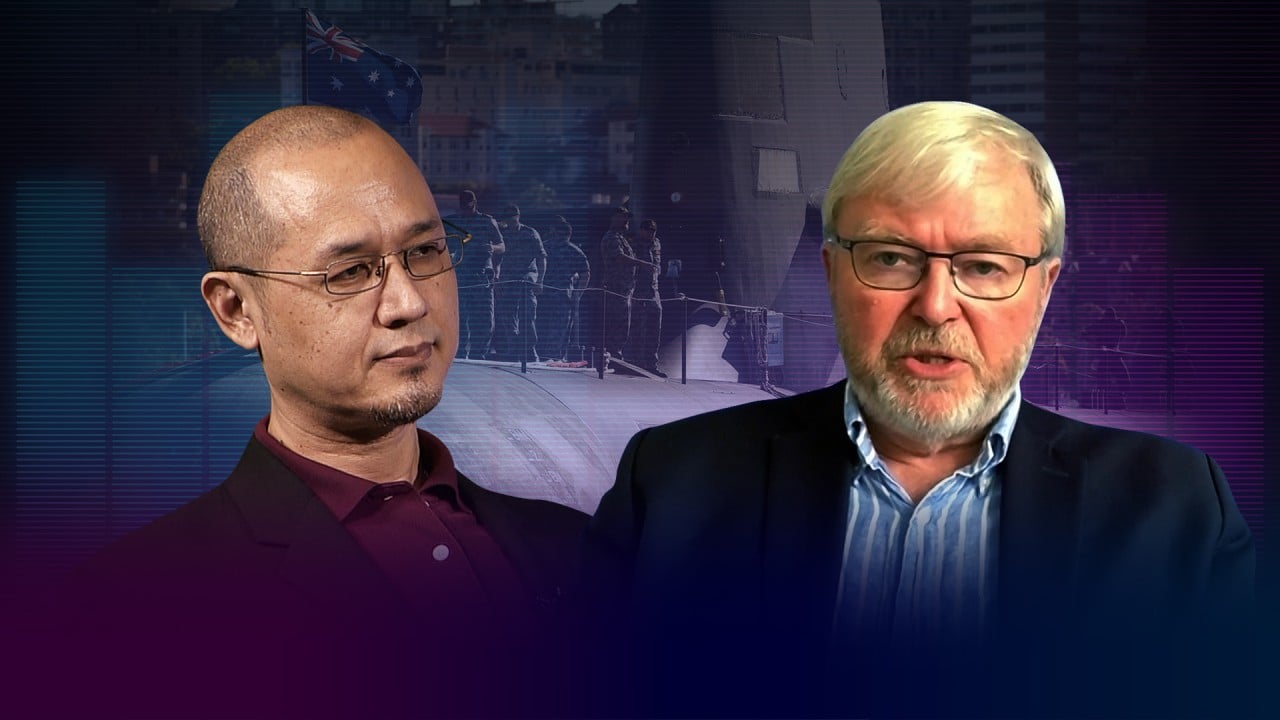
Is strained China-US relationship spiralling towards a Thucydides Trap scenario?
- President Xi Jinping has warned of the danger of strategic miscalculations
- Observers say Taiwan issue still poses biggest risk of armed confrontation
The US president at the time, Barack Obama, initially responded positively to Xi’s vague and all-encompassing proposal, made during a 2012 visit to Washington and partly aimed at breaking free of such historical patterns.
Obama publicly welcomed China’s peaceful rise and said in 2013 that “it is in the United States’ interest that China continues on the path of success”.
His national security adviser, Tom Donilon, said the administration disagreed with the premise “that a rising power and an established power are somehow destined for conflict”.
“There is nothing preordained about such an outcome,” he said.
The Thucydides Trap is a concept named after the Greek historian who wrote History of the Peloponnesian War over 2,500 years ago, recounting the 27-year conflict between a rising Athens and a declining Sparta.
It was first framed by American writer Herman Wouk in 1980 and popularised by Harvard professor Graham Allison in his 2017 book, Destined for War: Can America and China Escape Thucydides’s Trap?
Xi urged both sides to “work together to avoid the Thucydides Trap” and its disastrous global consequences in 2014 – by which time he had become China’s president – and said that seeking hegemony “is not in the DNA of the country given our long historical and cultural background”.
During his first state visit to the US as president, in 2015, Xi went further, saying, “There is no such thing as the so-called Thucydides Trap in the world.
“But should major countries time and again make the mistakes of strategic miscalculation, they might create such traps for themselves,” he cautioned.
Inevitable war? China, America and their next battlegrounds
“I’m sure that China’s leaders, both political and military, are sensitive to the fact … that the United States is vastly more powerful militarily than China,” Brzezinski said in an interview with the HuffPost news website. “In any case, I am confident that the top leadership of the two countries understands that a conflict between them would be mutually damaging.”
Before Xi’s 2015 visit, the Obama administration changed its attitude to the concept of “a new type of major power relations”, citing concerns over its connotations that China be recognised as an equal power and Beijing’s demand for respect for its core interests, including its territorial claims, political system and development path.
That marked the beginning of a seemingly intractable downward spiral in US-China ties following the demise of Washington’s decades-long engagement policy.
Give up ‘you lose or I win’ mentality, China tells US in positivity call
Nick Bisley, a professor of international relations at La Trobe University in Australia, said the US-China rivalry emerged slowly after the Obama administration began to refocus on Asia in 2010, a move Beijing saw as an effort to contain China’s rise.
“As that rivalry has grown, and in particular as it has become played out through military means, the risks of an accidental conflict increase,” he said.
Seventeen months into Joe Biden’s US presidency, Beijing now appears to have braced itself for a new cold war with Washington that needs to be managed carefully to avoid a head-on collision.
“Instead of working together towards a path to avert a potential conflict, China and the US have been sinking deeper into the Thucydides Trap, effectively making it a self-fulfilling prophecy,” said Pang Zhongying, an international affairs expert at Sichuan University.
Signs of a gathering storm in the US-China superpower rivalry have emerged in recent weeks, especially following public sparring by top military brass from both sides at the Shangri-La Dialogue in Singapore last month.
China, US defence chiefs square off on Taiwan in first face-to-face talks
Although Beijing dismisses the Thucydides Trap as a Western narrative trap and many international observers find it flawed and selective, Pang said the concept should be taken seriously given the danger of war.
“Despite their public statements that they do not seek confrontation or a new cold war, both sides have shown little inclination to avoid the Thucydides Trap,” he said. “The risk of an armed conflict is real.”
“China’s continuous rise would actually help prevent Beijing and Washington drifting towards war. Now with China’s prolonged economic slowdown and the decline of American leadership, I’m afraid the world is entering a period of greater uncertainty in the next five years,” he warned.
Zhiqun Zhu, a professor of international relations at Bucknell University in the US, said that for both Beijing and Washington, the biggest threat came from within.
As the Biden administration gears up to consolidate its alliance system in the Indo-Pacific, targeting China, it is facing uphill tasks at home of dealing with inflation, gun violence, assaults on American democracy and a divided society ahead of the midterm elections.
At a time when rancorous domestic politics have tarnished the global image of the US, a Yahoo News-YouGov poll last month showed about half of over 1,500 Americans surveyed believed America would “likely” not be a democracy one day.
In China, all its domestic problems are likely to converge in the near future, according to Zhu, including a slowing economy, widespread grievances, ethnic tensions, and a power struggle within the party.
New US space spy agency sees earthly rivalries being played out in orbit
There were hawks on both sides who would like to see confrontation and even military conflict between the two powers now, he said, adding that the big challenge for both countries was “to control the aggressive impulses in certain quarters of their respective governments, such as hawkish members of the US Congress and hardline PLA generals”.
“The danger is that both the US and Chinese governments may try to deflect domestic pressures by shifting attention to foreign affairs, thus creating tensions and even a crisis in the US-China relationship,” Zhu said.
George Magnus, an economist and a research associate at Oxford University’s China Centre, said the use of the Thucydides Trap construct to depict the inevitability of conflict between the US and China was not universally accepted as it could not account for the absence of shared borders or the high levels of interdependence between the two powers.
Could the US squeeze China between tariffs and the Indo-Pacific pact?
But he also warned Beijing was facing the harshest external environment in over five decades, with Western resistance to China’s perceived challenge to the global order expected to gather form and substance in the years to come.
“As Churchill reportedly said, ‘jaw-jaw is better than war-war’, and without dialogue, the risk of conflict gets bigger over time, even if as a result of accident or miscalculation,” Magnus said.
“If there is any relevance here regarding the Thucydides Trap, it is principally about the inevitability of the challenge by China to the US order, which the latter is bound to resist, but both the US and China are too far into their strategic competition to give Thucydides relevance right now.”
Wang Yi warns of ‘ferocious storms’ if US and Taipei abandon one-China policy
Gal Luft, co-director of the Washington-based Institute for the Analysis of Global Security, said that while China was unlikely to launch an unprovoked attack on Taiwan, there was an escalatory dynamic, akin to Russia’s war in Ukraine, which ultimately led to a military solution.
He said the most likely scenario was China responding to a string of US provocations, most importantly shipments to the island of game-changing weapons that would radically alter the delicate balance of power across the strait.
“In such a case, China would try to impose a blockade on Taiwan, similar to what Kennedy did in Cuba 60 years ago, attempting to stop and search ships heading to the island. This would immediately put the two countries on a collision course and, given the lack of guardrails, it will be very difficult to stop the escalation,” he said.
“So the most important element of stability is for the two sides to agree on full transparency when it comes to military shipments to Taiwan and to establish a permanent and effective crisis-management system, including backchannels.”
Luft also challenged the prevailing view that China would be deterred by American military supremacy.
“China is capable of winning a war against the US, especially in a battlefield so close to its territory and thousands of miles from the US,” he said, adding that war games conducted recently in the US showed China having the upper hand.
“We should not take the conventional narrative of American military superiority as gospel,” Luft said. “There are too many other, intangible elements of national power – social cohesion, political unity, staying power, and national pride to name a few – which are no less important in the pursuit of military victory.”
Growing isolation puts China, US ‘on the brink’ of a new cold war
In almost every case study described in Allison’s book, there were those who argued at the time that the ascending power was unprepared to challenge the incumbent one. But according to Luft, “in most cases this proved to be incorrect, and I suspect that this would be the case if the US and China ended up in a war”.
The Ukraine war also showed the US was not ready to enter a direct military conflict with a nuclear power, he said, despite its willingness to send arms and impose every form of financial punishment.
“In the case of Taiwan, this is not enough to deter China,” Luft said.
Why Beijing thinks Taiwan is different from Ukraine
But Bisley said that while Washington had refused to get engaged militarily in the conflict in Ukraine, it would get involved in Taiwan under some specific circumstances.
Bisley warned that rising nationalist sentiment in China could “box the Chinese leadership in” over the Taiwan issue. “It is why the US and other outside parties need to ensure that, on Taiwan, the leadership in Beijing can feel it has a wider array of choices than may appear to be the case if the nationalism wolves are howling,” he said.
“Nationalism in China, especially against the backdrop of a weakened economy and zero-Covid consequences, is an unhelpful backdrop against which to anticipate peaceful external relations,” he said.
“We should assume therefore that it suits Beijing to keep the threat to Taiwan uppermost in the public consciousness … whether China activates the threat is a moot point.”
‘I’m concerned’: Biden’s Taiwan defence vow could cause missteps, analysts say
Benoit Hardy-Chartrand, an international affairs expert at Temple University in Tokyo, warned it would be “very risky” for Xi to use force during a period of leadership transition and a slowing economy, considering the possible lasting damage to China’s global standing.
“Although it is difficult to know how much the war in Ukraine has altered the strategic calculus of Beijing, it is likely that the unexpectedly strong Western response to the Russian invasion is forcing the Chinese leadership to carefully consider the potential repercussions of a war in the Taiwan Strait,” he said.
“All in all, the status quo, while it may not be sustainable in the long run in the face of nationalist pressures, remains the most viable option.”
Unofficial US-China dialogue: seeing worst in each other undermines relations
Hardy-Chartrand also cautioned that the pervasive mistrust between the two sides would not only make it difficult for both to step off the current path towards confrontation, but also increase the risk of small incidents escalating towards a conflict that neither side wants.
“This is why there must be efforts at re-engagement at the highest levels,” he said.
Xi is expected to meet Biden in a virtual summit in the coming weeks, according to the US leader, which observers hope will help set up guardrails to prevent their adversarial ties from spiralling out of control.
‘Inevitable’ US-Taiwan trade deal seen pulling island more into US orbit
Orville Schell, Arthur Ross director of the New York-based Asia Society’s centre on US-China relations, said the only way to prevent US-China relations from spiralling into war was for both sides to adopt a more reciprocal and flexible posture.
“A Thucydides Trap may be likely, but not inevitable. It is the role of a great leader to find a way around such a seeming inevitability,” he said. “Why would Xi ever put all of China’s immense and esteemed developmental progress at risk, especially when it is evident that Biden is both willing and eager to find an off-ramp?”
But Frans-Paul van der Putten, a senior research fellow at the Clingendael Institute, a Dutch think tank, and coordinator of its China centre, cautioned against any rosy expectations about the virtual summit.
“They are of little help in the current situation, where both sides are deeply suspicious of each other and not inclined to substantially improve their relationship,” he said. “Both sides seem to be increasingly concerned that deterrence may not work. This leads to more dangerous behaviour on both sides as they increase their efforts to deter the other while preparing for a possible war.”
US-China cold war could split world in two, UN chief Guterres says
“We are in a precarious situation, with bilateral ties drifting towards decoupling,” Pang said. “To avoid the escalation of US-China tensions, it is imperative for Beijing to send out clear signals that it wants to make amends and reset ties with Washington at the party gathering.”
The Chinese leadership should realise that the Biden presidency offers a rare window of opportunity for both sides to seek detente and work out crisis-management mechanisms to prevent a precipitous decline in bilateral ties, he said.
But Schell was sceptical whether impending personnel changes, including key positions such as China’s foreign minister, would make much difference.
“Xi makes every decision of importance in China. Since appointees to high positions are all decided by him, he bears the responsibility for what they do and say. If he would like to signal a change to the US, it is easily done,” he said.
Schell described Biden as a leader who was committed to preventing conflict and his administration as being eager to “embrace any such signal of moderation from Beijing”.
“If Beijing cannot find a way to use this moment when a reasonable US president is in the White House to send such a signal, they may rue the missed opportunity later on,” he said.








